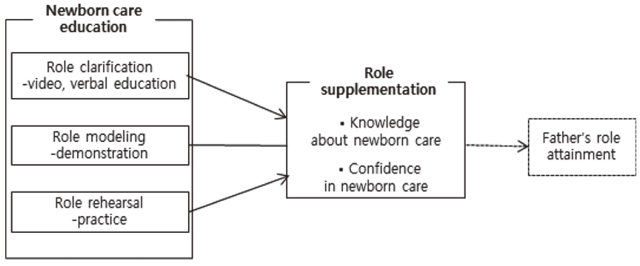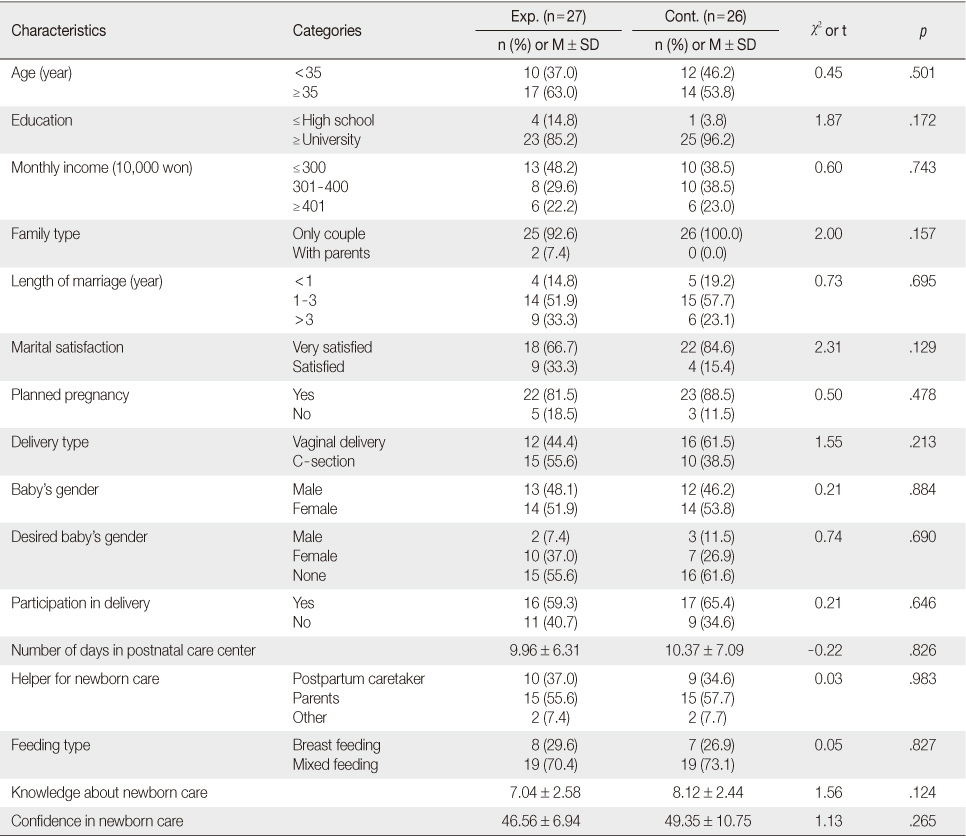Articles
- Page Path
- HOME > J Korean Acad Nurs > Volume 44(4); 2014 > Article
-
Original Article
- Effects of Newborn Care Education for First-time Fathers on Their Knowledge and Confidence in Newborn Care at Postpartum One Month
- Hye-Sun An, Kyung-Sook Bang
-
Journal of Korean Academy of Nursing 2014;44(4):428-436.
DOI: https://doi.org/10.4040/jkan.2014.44.4.428
Published online: August 29, 2014
1Seoul Metropolitan Government Boramae Medical Center, Seoul, Korea.
2College of Nursing·The Research Institute of Nursing Science, Seoul National University, Seoul, Korea.
- Address reprint requests to: Bang, Kyung-Sook, College of Nursing, Seoul National University, 103 Daehak-ro, Jongno-gu, Seoul 110-799, Korea. Tel: +82-2-740-8819, Fax: +82-2-765-4103, ksbang@snu.ac.kr
© 2014 Korean Society of Nursing Science
This is an Open Access article distributed under the terms of the Creative Commons Attribution NoDerivs License. (http://creativecommons.org/licenses/by-nd/4.0/) If the original work is properly cited and retained without any modification or reproduction, it can be used and re-distributed in any format and medium.
- 1,336 Views
- 32 Download
- 5 Crossref
Abstract
-
Purpose
- This study was conducted to identify the effects of newborn care education for fathers on their knowledge and confidence in newborn care at postpartum one month.
-
Methods
- A nonequivalent control group pretest posttest design was used. The participants were 53 first-time fathers of newborns, 27 in experimental group, and 26 in control group. They were recruited at the nursery of one municipal hospital in Seoul. For the experimental group, a 50-minute education on newborn care using video, verbal education, demonstration and practice were provided prior to discharge. Fathers' knowledge and confidence in newborn care and their satisfaction with the education program were measured at postpartum one month.
-
Results
- The fathers in the experimental group showed significantly higher knowledge (t=-4.51, p<.001), and confidence in newborn care (t=-2.29, p=.026) compared to the control group at postpartum one month. Fathers in the experimental group had a satisfaction score of 27.37±2.73 immediately after the education, and 25.30±3.40 at postpartum one month.
-
Conclusion
- Results indicate that newborn care education for first-time fathers is an effective method in enhancing the level of knowledge and confidence in newborn care. It can be used in the nursery department before discharge as a useful nursing intervention.
This manuscript is a condensed form of the first author's master's thesis from Seoul National University.
- 1. Choi HS, Lee KS. Development of the pre-father education program: Based on developmental approach and narrative therapeutic perspective. J Korean Home Manage Assoc. 2006;24(2):177–193.
- 2. McVeigh CA, Baafi M, Williamson M. Functional status after fatherhood: An Australian study. J Obstet Gynecol Neonatal Nurs. 2002;31(2):165–171.ArticlePubMed
- 3. Kim YD, Lee DK. The parenting characteristics of inexperienced father and the process of becoming father. J Child Lit Educ. 2011;12(1):353–380.
- 4. Shin SH, Jeon GY. The effect on parenting stress of the employed mothers with infants. J Parent Educ. 2005;2(2):31–61.
- 5. Early R. Men as consumers of maternity services: A contradiction in terms. Int J Consum Stud. 2001;25(2):160–167. http://dx.doi.org/10.1111/j.1470-6431.2001.00191.xArticle
- 6. Lim JA, Yoo EK. A study on the effects of father class upon father's level of knowledge and confidence about postpartal woman and newborn care. Korean J Women Health Nurs. 2002;8(3):345–357.ArticlePDF
- 7. Song JE, Ahn JA. Effect of intervention programs for improving maternal adaptation in Korea: Systematic review. Korean J Women Health Nurs. 2013;19(3):129–141. http://dx.doi.org/10.4069/kjwhn.2013.19.3.129ArticlePubMed
- 8. Fägerskiöld A. Support of fathers of infants by the child health nurse. Scand J Caring Sci. 2006;20(1):79–85. http://dx.doi.org/10.1111/j.1471-6712.2006.00383.xArticlePubMed
- 9. McKellar L, Pincombe J, Henderson A. Enhancing fathers' educational experiences during the early postnatal period. J Perinat Educ. 2008;17(4):12–20. http://dx.doi.org/10.1624/105812408x364134ArticlePubMedPMC
- 10. Stgeorge JM, Fletcher RJ. Fathers online: Learning about fatherhood through the internet. J Perinat Educ. 2011;20(3):154–162. http://dx.doi.org/10.1891/1058-1243.20.3.154ArticlePubMedPMC
- 11. Habib C, Lancaster S. The transition to fatherhood: Identity and bonding in early pregnancy. Fathering. 2006;4(3):235–253.Article
- 12. Oh J, Oh YA, Nam YH. The paternal attachment to neonate in one hospital. Korean Parent Child Health J. 2005;8(2):137–146.
- 13. Draper J. Men's passage to fatherhood: An analysis of the contemporary relevance of transition theory. Nurs Inq. 2003;10(1):66–77.ArticlePubMed
- 14. Waterston T, Welsh B. Helping fathers understand their new infant: A pilot study of a parenting newsletter. Community Pract. 2006;79(9):293–295.PubMed
- 15. Choi K. Comparative study of discharge teaching programs on newborn care [master's thesis]. Seoul, Yonsei University. 2002.
- 16. Ryu KH, Chang KH, Han SS. Effects of maternity education before discharge on postpartum self-care and newborn baby care. J Korean Public Health Assoc. 2003;29(3-4):230–238.
- 17. Naunboonruang P. Evaluation of effects of an educational program on knowledge about infant behaviors and characteristics and self-confidence of first-time fathers in Lampang Province, Thailand [dissertation]. Birmingham, AL, The University of Alabama at Birmingham. 2002.
- 18. Meleis AI. Role insufficiency and role supplementation: A conceptual framework. Nurs Resh. 1975;24(4):264–271.
- 19. Seo YM. The effect of education program on primiparas' knowledge, confidence and accuracy of behavior in newborn care. J Korean Acad Nurs. 1998;28(4):1060–1074.ArticlePDF
- 20. Kwak YH, Lee M. The effects of education on knowledge and confidence in postpartal self-care and newborn baby care. J Korean Acad Womens Health Nurs. 1996;2(2):246–256.ArticlePDF
- 21. Heo YS. A study on the effects of nurturing and education methods for new-born babies [master's thesis]. Seoul, Hanyang University. 2004.
- 22. Krouse HJ. Video modelling to educate patients. J Adv Nurs. 2001;33(6):748–757.ArticlePubMed
- 23. Sim KS, Kho HJ, Lim KH. A study on the educational needs of the mothers for the infant care. J Korean Soc Matern Child Health. 2002;6(2):287–296.
- 24. Sarkadi A, Kristiansson R, Oberklaid F, Bremberg S. Fathers' involvement and children's developmental outcomes: A systematic review of longitudinal studies. Acta Paediatr. 2008;97(2):153–158. http://dx.doi.org/10.1111/j.1651-2227.2007.00572.xArticlePubMed
- 25. Yang JH, Yang B. Nursing students' experiences with facilitator in problem-based learning class. Asian Nurs Res. 2013;7(4):198–204. http://dx.doi.org/10.1016/j.anr.2013.10.002Article
REFERENCES
Figure & Data
REFERENCES
Citations

- South Korean first-time mothers’ knowledge of digestive health problems in infancy and their utilization of health care facilities for digestive health concerns: a descriptive study
Yijin Lee, Kyung-Sook Bang
Child Health Nursing Research.2024; 30(3): 199. CrossRef - Perceptions of fatherhood and confidence regarding neonatal care among fathers of high-risk neonates in South Korea: a descriptive study
Jin Won Lee, Sunhee Lee
Child Health Nursing Research.2023; 29(3): 229. CrossRef - Knowledge, confidence, and educational needs of newborn care among North Korean refugee women: a descriptive study
In-Sook Lee
Child Health Nursing Research.2023; 29(1): 72. CrossRef - Effects of a hybrid online and offline program for facilitating father-infant interactions in South Korea: a quasi-experimental study
Sae-Eun Park, Kyung-Sook Bang
Child Health Nursing Research.2022; 28(2): 132. CrossRef - A Study of First-time Fathers on Their Knowledge and Confidence in Newborn
NamSuk Kim
Journal of Digital Convergence.2016; 14(8): 537. CrossRef

Figure 1
Newborn Care Education
Homogeneity Test of the Father's Characteristics and Pre-test for Father's Knowledge and Confidence
Exp.=Experimental group; Cont.=Control group.
Comparisons of Knowledge and Confidence in Newborn Care between Experimental and Control Group at Postpartum One Month
Exp.=Experimental group; Cont.=Control group.
Comparisons of Knowledge, Confidence, and Satisfaction with Education on Newborn Care for Fathers in the Experimental Group (N=27)
Exp.=Experimental group; Cont.=Control group.
Exp.=Experimental group; Cont.=Control group.
 KSNS
KSNS
 E-SUBMISSION
E-SUBMISSION





 Cite
Cite

